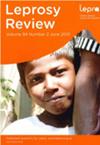The need for an integrated, contextual, and holistic, minimum essential data collection tool for leprosy and lymphatic filariasis disability in India
IF 0.8
4区 医学
Q4 DERMATOLOGY
引用次数: 0
Abstract
SummaryAim To develop an integrated, contextual, and holistic, minimum essential data collection tool to reliably assess, and obtain a broad overview of issues needing attention among people suffering with WHO Grade 2 leprosy disability and WHO Grade 3 and above lymphatic filariasis (LF) disability in India, to enable the design of integrated and customized interventions to improve their situations. Process A review of universal tools measuring activity limitations, stigma, participation restrictions, mental wellbeing, quality of life, and community stigma, was carried out for their applicability to leprosy and LF disability. A focus group discussion was conducted with field staff who had used these tools, to learn from their experiences. Questions for the minimum essential data tool were formulated based on their applicability and relevance to people with severe leprosy and LF disabilities, their context, and to our aim. A hybrid quantitative and qualitative minimum essential data tool was developed, integrating leprosy and LF disability related issues to holistically assess situations, capture lived experiences, and enable living with leprosy and LF disability within the cultural and environmental context of rural India.对印度麻风病和淋巴丝虫病残疾的综合、背景和整体的最低基本数据收集工具的需求
目的开发一种综合的、有背景的、整体的最低必要数据收集工具,以可靠地评估和获得印度世卫组织二级麻风残疾和世卫组织三级及以上淋巴丝虫病(LF)残疾患者需要注意的问题的广泛概况,从而能够设计综合和定制的干预措施,以改善他们的情况。对活动限制、病耻感、参与限制、心理健康、生活质量和社区病耻感的通用测量工具进行了回顾,以确定其对麻风病和LF残疾的适用性。与使用这些工具的外地工作人员进行了焦点小组讨论,以学习他们的经验。最低基本数据工具的问题是根据其对严重麻风病和LF残疾者的适用性和相关性、他们的背景以及我们的目标来制定的。开发了一种混合定量和定性的最低基本数据工具,整合了麻风病和LF残疾相关问题,以全面评估情况,捕捉生活经验,并使麻风病和LF残疾患者能够在印度农村的文化和环境背景下生活。
本文章由计算机程序翻译,如有差异,请以英文原文为准。
求助全文
约1分钟内获得全文
求助全文
来源期刊

Leprosy review
医学-病理学
CiteScore
1.10
自引率
16.70%
发文量
35
审稿时长
>12 weeks
期刊介绍:
Leprosy Review is an Open Access peer reviewed journal including original papers on all aspects of leprosy. Topics published include research into the medical, physical and social aspects of leprosy and information relevant to leprosy control. We publish original research, short reports, case studies and reviews. The vision of the journal is to improve the management and control of leprosy and its consequences, by publishing relevant research and sharing experiences and best practices.
 求助内容:
求助内容: 应助结果提醒方式:
应助结果提醒方式:


